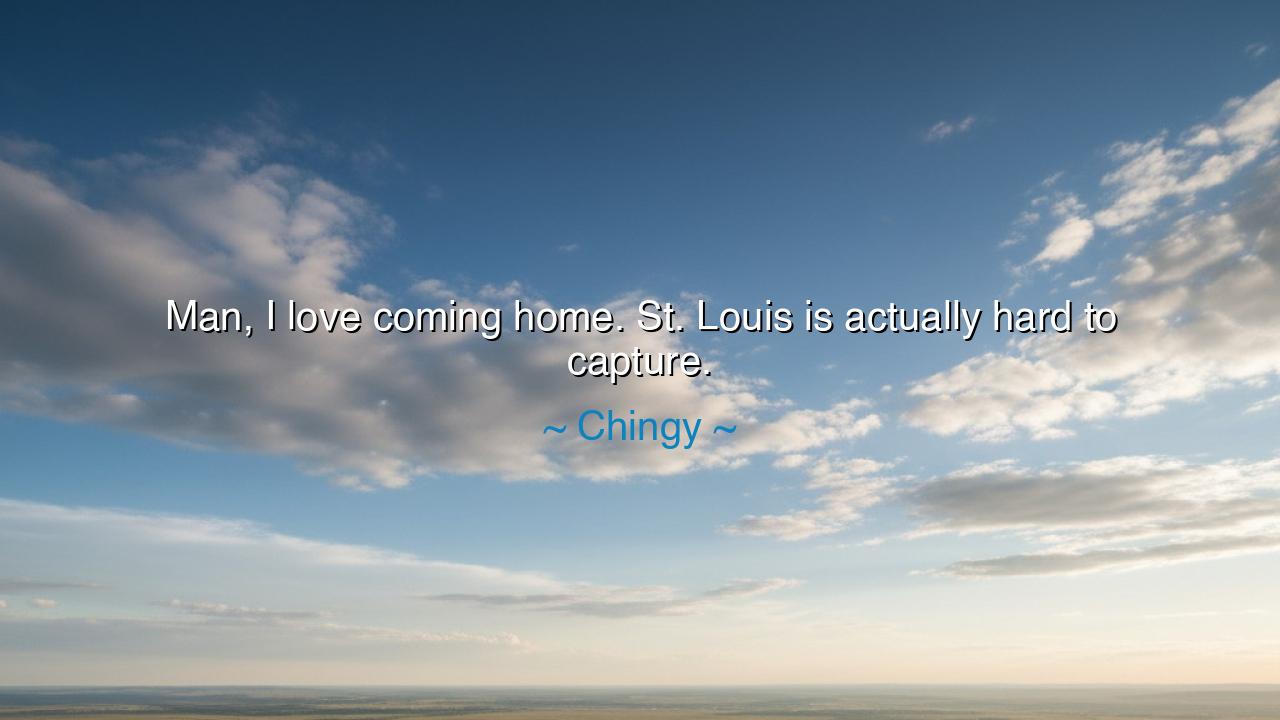
Man, I love coming home. St. Louis is actually hard to capture.






“Man, I love coming home. St. Louis is actually hard to capture.” Thus spoke Chingy, the son of Missouri and voice of the Midwest, whose words, though simple, echo with a profound nostalgia that has bound humankind since the dawn of civilization. Beneath his casual tone lies the eternal truth: that home — the place of our origin, of memory and belonging — holds a power no artist can fully describe. His phrase, “hard to capture,” does not merely refer to a city of streets and buildings; it speaks of a feeling, a spirit that lives between moments — something felt deeply but rarely expressed in words. For home is not a place we see; it is a place we carry within.
When Chingy says, “I love coming home,” he joins a lineage of poets, warriors, and wanderers who have sung the same refrain across the ages. For all journeys, no matter how grand, lead back to the hearth. The traveler may cross seas, earn gold, and bask in acclaim, but when the night grows quiet, his heart yearns for the place where he first learned to dream. In saying that his city, St. Louis, is “hard to capture,” Chingy names a truth all who love deeply understand — that the essence of what shapes us cannot be confined to description. It lives in sound and scent, in memory and rhythm, in the faces that welcomed us before the world demanded we prove ourselves.
The ancients spoke of this longing often. Odysseus, king of Ithaca, wandered for ten years after war, passing through the lands of monsters, gods, and storms. He saw marvels and terror, yet none of it satisfied the ache for home. His kingdom was humble compared to the empires he had seen, but to him, it was everything — for it was his own. When he returned at last, he wept not for victory, but for belonging. In this way, Chingy’s words are kin to the voice of Odysseus. Though the modern world replaces ships with airplanes and harbors with cities, the journey of the heart remains the same: wherever we go, we carry the desire to return to what made us who we are.
St. Louis, for Chingy, is more than geography — it is identity. It is the rhythm of its people, the pulse of its streets, the flavor of its history. To him, it is both anchor and muse, grounding him even as he moves through the vast and shifting world of fame. When he says it is “hard to capture,” he acknowledges that the soul of a place cannot be reduced to photograph or song. For cities, like people, are alive — shaped by struggle, pride, and love. To understand them is to understand their contradictions: beauty and hardship, triumph and decay. His city, like all cities, is a mirror of human nature itself — too complex, too sacred, too real to ever be fully contained.
Consider also Langston Hughes, the poet of Harlem, who spoke of rivers older than pain and cities filled with music and yearning. Like Chingy, he found in his home not perfection, but truth. Both men, in their own art, sought to translate the untranslatable — the feeling of belonging to a place that raised you, flawed yet full of spirit. This is the paradox of home: it may frustrate you, confine you, or even wound you, and yet you love it still. To leave is to breathe; to return is to live. Chingy’s confession is the echo of this universal heartbeat.
But there is also a lesson hidden in his words. When he says, “I love coming home,” he reminds us that no matter how far we travel, we must not forget our roots. The modern world teaches restlessness — it glorifies departure and novelty — yet wisdom lies in remembrance. For the one who forgets where he came from loses not only direction, but soul. Home, in whatever form it takes, is the compass of the heart. It teaches humility, gratitude, and continuity. To return home — whether in body or in memory — is to honor the journey that shaped you.
So, my children, learn from Chingy’s humble truth. Celebrate your triumphs, wander widely, but do not scorn your origins. Let your heart remain tethered to the soil that first nourished it. Whether your home is a city of spires or a small town by the river, hold it close, for it holds the story of your becoming. And when you return, do so with reverence — for though the world may change, the essence of home endures beyond time and description. Like St. Louis for Chingy, your home will always be “hard to capture” — not because it is small, but because it is infinite, alive in every breath of who you are.






AAdministratorAdministrator
Welcome, honored guests. Please leave a comment, we will respond soon